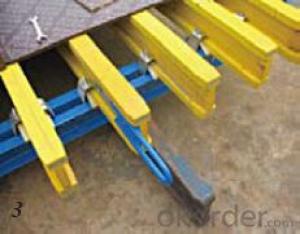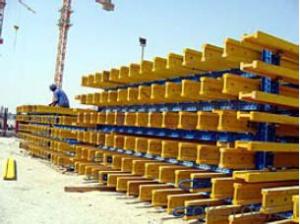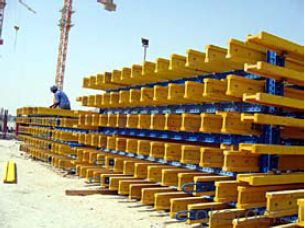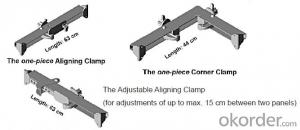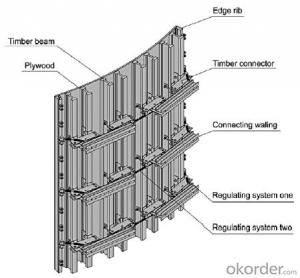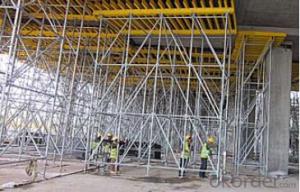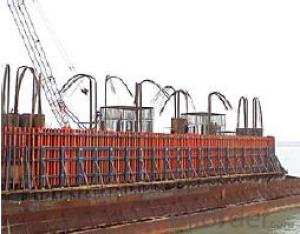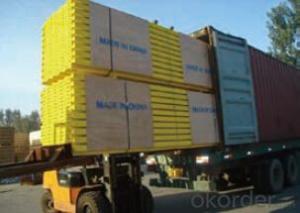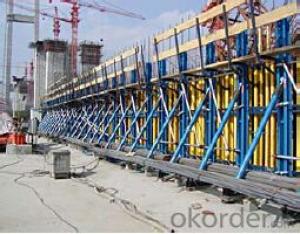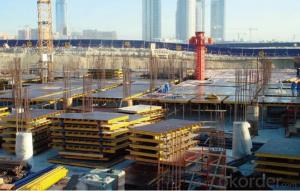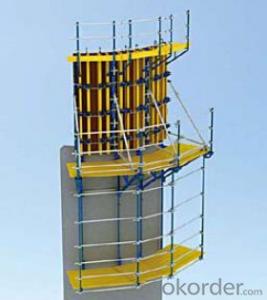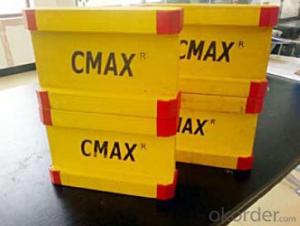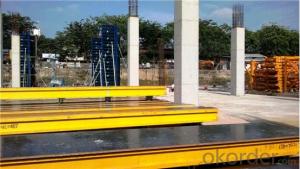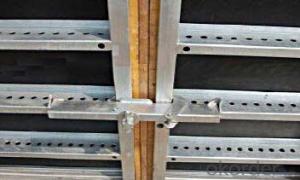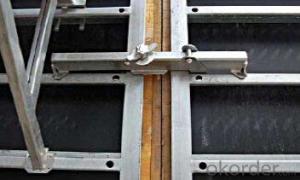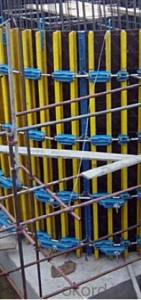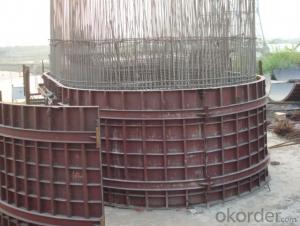Timber-Beam Plywood Formwork for building Construction
- Loading Port:
- Tianjin
- Payment Terms:
- TT OR LC
- Min Order Qty:
- 50 m²
- Supply Capability:
- 1000 m²/month
OKorder Service Pledge
Quality Product, Order Online Tracking, Timely Delivery
OKorder Financial Service
Credit Rating, Credit Services, Credit Purchasing
You Might Also Like
Plywood --- make perfect concrete surface
WISA-Form Birch is a coated special plywood using in the formwork systems where high
requirements are set on the concrete surface and the times of reuses.
With CNBM timber beam & WISA plywood, the formwork is low weight but high load capacity, it is
widely used in construction.
Characteristics:
◆ Component with high standardization.
◆ Assembling in site, flexible application.
◆ Light weight, easy transportation and storage.
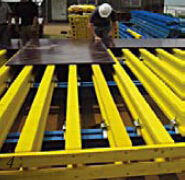
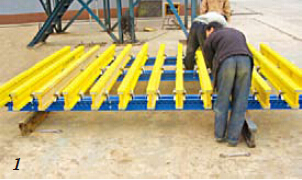
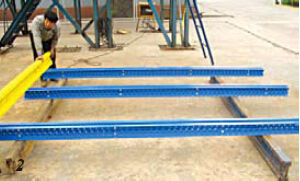
- Q: Are there any regulations or standards that govern the use of steel formwork?
- Steel formwork in construction projects is subject to regulations and standards to guarantee safety, quality, and durability. The American National Standards Institute (ANSI) A10.9-2013 standard is widely recognized for safety requirements in concrete and masonry construction. It provides guidelines for formwork usage, including steel formwork, covering design, construction, inspection, and maintenance. Beside ANSI, the Occupational Safety and Health Administration (OSHA) in the United States and the Health and Safety Executive (HSE) in the United Kingdom establish regulations and guidelines for safe steel formwork utilization. These regulations encompass worker safety, proper assembly and dismantling procedures, and the use of suitable protective equipment. Furthermore, international standards like ISO 9001:2015 for quality management systems are applicable to steel formwork manufacturing and installation processes. These standards guarantee that the steel formwork meets specific quality and performance criteria. Construction companies and contractors must comply with these regulations and standards to ensure worker safety and project success. Noncompliance can lead to penalties, legal issues, and on-site accidents. Consequently, staying up-to-date with the latest regulations and standards related to steel formwork is crucial and their implementation is vital.
- Q: What are the different types of finishes available for steel formwork panels?
- There are several different types of finishes available for steel formwork panels, each offering unique benefits and applications. 1. Smooth Finish: This is the most common type of finish for steel formwork panels. It provides a smooth surface, ensuring a clean and precise finish on the concrete. Smooth finishes are ideal for projects where a high-quality surface is required, such as architectural structures or exposed concrete elements. 2. Textured Finish: Textured finishes add a decorative or non-slip surface to the steel formwork panels. These finishes can be achieved through various methods, including brushing, sandblasting, or applying textured coatings. Textured finishes are commonly used for pedestrian walkways, ramps, or areas where traction is important. 3. Patterned Finish: Patterned finishes offer a unique aesthetic appeal to the concrete surface. They can be achieved by incorporating patterns or designs into the steel formwork panels, such as stamped or embossed patterns. Patterned finishes are often used in decorative applications, such as building facades, retaining walls, or interior wall panels. 4. Coated Finish: Coated finishes involve applying a protective coating to the steel formwork panels. This coating can be a paint or a specialized protective material, such as epoxy or polyurethane. Coated finishes provide additional durability, corrosion resistance, and weather resistance to the panels, making them suitable for long-term use in harsh environments. 5. Polished Finish: Polished finishes involve polishing the steel formwork panels to create a reflective surface. This type of finish is commonly used in architectural or decorative applications where a high-gloss, mirror-like appearance is desired. Polished finishes can enhance the aesthetics of the concrete surface and create a visually striking effect. Overall, the choice of finish for steel formwork panels depends on the specific requirements of the project, including the desired surface quality, functionality, and aesthetics. It is important to consider factors such as durability, ease of maintenance, cost, and environmental impact when selecting the appropriate finish for steel formwork panels.
- Q: How does steel formwork affect the overall strength of the structure?
- Steel formwork can greatly affect the overall strength of a structure in a positive way. Steel is known for its exceptional strength and durability, making it an ideal material for formwork. When used in construction, steel formwork provides a rigid framework that supports the weight of the concrete during the pouring and curing process. The use of steel formwork ensures that the concrete is properly contained and supported, preventing any deformation or collapse during the hardening phase. This is crucial for maintaining the structural integrity of the building, as any failure in the formwork can lead to serious consequences. Steel formwork also allows for greater flexibility in design, as it can be easily customized and shaped according to the desired structure. This versatility enables engineers and architects to create complex and innovative designs without compromising the strength of the building. Moreover, steel formwork has a longer lifespan compared to other types of formwork materials, such as wood or plastic. Its durability ensures that the formwork can be reused multiple times, reducing construction costs and minimizing waste. This not only makes it cost-effective but also contributes to sustainability in the construction industry. In summary, steel formwork positively impacts the overall strength of a structure by providing a robust and reliable support system for the concrete. Its strength, durability, and flexibility make it an excellent choice for ensuring the structural integrity and longevity of buildings.
- Q: How long does steel formwork last?
- The lifespan of steel formwork can vary depending on various factors such as the quality of the steel used, the type and frequency of usage, and the maintenance practices employed. Generally, steel formwork is known for its durability and longevity, and when properly maintained, it can last for several years or even decades. With regular maintenance and proper handling, steel formwork can withstand multiple uses and continue to perform effectively. However, it is important to note that steel formwork may experience wear and tear over time due to the constant exposure to concrete, which can lead to surface corrosion or deterioration. This can be mitigated by applying protective coatings or cleaning the formwork after each use. Furthermore, the lifespan of steel formwork can also be influenced by external factors such as environmental conditions and the type of concrete being poured. Harsh weather conditions or exposure to chemicals can accelerate the corrosion process, potentially reducing the lifespan of the formwork. To ensure the longevity of steel formwork, it is important to invest in high-quality steel with proper anti-corrosion properties, carry out regular inspections, and perform necessary maintenance and repairs when needed. By following these practices, steel formwork can last for a considerable amount of time, making it a cost-effective and reliable option for construction projects.
- Q: What are the components of a steel formwork system?
- A steel formwork system typically consists of several components that work together to create a sturdy and efficient construction formwork. These components include: 1. Steel Panels: The primary component of a steel formwork system is the steel panels. These panels are usually made of high-quality steel and come in various sizes and shapes. They are designed to withstand the pressure exerted by the concrete during the pouring process. 2. Steel Walers and Soldiers: Steel walers are horizontal members that connect the steel panels together, providing additional strength and stability to the formwork system. Soldiers, on the other hand, are vertical members that support the steel panels and prevent them from bulging or deforming under the weight of the concrete. 3. Tie Rods: Tie rods are used to hold the steel panels and walers together. They are threaded rods that pass through holes in the panels and are secured with nuts and washers. Tie rods help to maintain the structural integrity of the formwork system and resist the outward pressure exerted by the wet concrete. 4. Formwork Accessories: There are several accessories that are used in conjunction with steel formwork systems to enhance their efficiency and ease of use. These accessories include formwork clamps, formwork pins, formwork cones, and wedges. These accessories help to align and secure the formwork components, ensuring a tight fit and preventing any movement during the concrete pouring process. 5. Formwork Braces: Formwork braces are diagonal members that are used to provide additional support and stability to the formwork system. They are typically made of steel and are installed at regular intervals to prevent any sagging or buckling of the formwork. 6. Formwork Joints: Formwork joints are used to connect different sections of the steel formwork system. These joints can be either temporary or permanent, depending on the requirements of the construction project. Temporary joints are typically used for modular formwork systems, allowing for easy assembly and disassembly. Overall, a steel formwork system is a robust and durable solution for constructing concrete structures. Its components work together to create a strong and reliable formwork that can withstand the pressures exerted during the concrete pouring process.
- Q: What are the different types of steel formwork ties and connectors?
- There are several different types of steel formwork ties and connectors used in construction projects. These ties and connectors are essential for securing and connecting formwork panels, ensuring the stability and strength of the concrete structure being built. 1. Snap Ties: Snap ties are one of the most commonly used types of formwork ties. They consist of two parts - a metal rod and a flat metal plate. The rod is inserted through the formwork panels and then snapped onto the plate, holding the panels securely in place. 2. Wedge Ties: Wedge ties are another popular formwork tie option. They consist of a metal rod with a wedge-shaped end and a flat metal plate. The rod is inserted through the formwork panels, and the wedge is driven into a slot on the rod, creating a tight connection between the panels. 3. Loop Ties: Loop ties are commonly used in situations where the formwork panels need to be easily adjustable or repositioned. They consist of a metal rod with a loop at one end and a flat metal plate at the other. The loop is inserted through the formwork panels, and the rod is bent to secure the panels together. 4. Flat Ties: Flat ties are similar to snap ties but do not have a snap mechanism. They are made of a flat metal plate with holes for inserting a metal rod. The rod is inserted through the formwork panels, and the flat tie is secured by twisting the rod or using a locking device. 5. Tie Rods: Tie rods are used in conjunction with various formwork ties to provide additional strength and stability. They are long steel rods that are inserted through the formwork panels and secured with nuts and washers on both ends. 6. Formwork Clamps: Formwork clamps are connectors used to join and align formwork panels. They are typically made of steel and have adjustable screws or bolts to tighten and secure the panels together. 7. Combi Nuts: Combi nuts are used in combination with tie rods and formwork clamps to connect and tighten formwork panels. They have a threaded hole that allows the tie rod to pass through and secure the panels. These are some of the common types of steel formwork ties and connectors used in construction projects. The selection of the appropriate type depends on factors such as the formwork system being used, the load requirements, and the specific needs of the project.
- Q: Can steel formwork be used for sports complex construction projects?
- Yes, steel formwork can be used for sports complex construction projects. Steel formwork is a versatile and durable option for creating the desired shapes and structures required for sports complexes. It can be used to construct various elements of the complex, such as walls, columns, beams, and slabs. Steel formwork offers high strength and stability, allowing for larger spans and higher load-bearing capacity, which are often necessary for sports facilities. Additionally, the smooth finish achieved with steel formwork helps to create a professional and aesthetically pleasing appearance. Overall, steel formwork is a suitable choice for sports complex construction projects due to its strength, flexibility, and ability to create complex structures efficiently.
- Q: How does steel formwork handle different concrete water-cement ratio specifications?
- Due to its inherent strength and durability, steel formwork is widely favored for managing various concrete water-cement ratio specifications. Its robust design enables it to withstand the pressure exerted by wet concrete during pouring and curing, regardless of the water-cement ratio. The water-cement ratio in concrete refers to the proportion of water used in relation to the amount of cement. It plays a pivotal role in determining the concrete's strength, workability, and durability. Different water-cement ratio specifications are often necessary for different construction projects, depending on factors such as the desired concrete strength and environmental conditions. Steel formwork offers a strong and rigid framework that effectively contains different concrete mixtures, irrespective of the water-cement ratio. The steel panels and frames are specifically engineered to securely hold the wet concrete, preventing any leakage or deformation during casting and curing. This guarantees that the concrete retains its desired shape and strength. Furthermore, the reusability of steel formwork is advantageous, particularly when dealing with varying water-cement ratio specifications. Once the concrete has set and cured, the steel formwork can be easily disassembled, cleaned, and reassembled for future use. This not only saves time and money but also provides flexibility in adapting to different water-cement ratio requirements. Additionally, steel formwork systems can be easily adjusted and customized to accommodate specific project needs. This includes modifying the formwork to achieve the desired concrete surface finish and shape. The versatility of steel formwork enables contractors to work with different water-cement ratio specifications without compromising the quality and integrity of the final concrete structure. In conclusion, steel formwork is an excellent option for managing various concrete water-cement ratio specifications. Its strength, durability, and adaptability make it a reliable solution for containing wet concrete and ensuring the maintenance of the desired water-cement ratio throughout the construction process.
- Q: How does steel formwork contribute to the overall accuracy of concrete placement?
- There are several ways in which steel formwork contributes to the accuracy of concrete placement. Firstly, it provides a strong and stable structure, ensuring that the concrete is poured and cured in the desired shape and dimensions. The steel panels are designed to be resistant to deformation, reducing the risk of the formwork shifting or warping during pouring. Moreover, steel formwork allows for precise control over alignment and leveling. The panels can be easily adjusted and secured, ensuring that the concrete is poured at the intended level and alignment. This is particularly important for projects that require high accuracy, such as those with intricate architectural designs or precise measurements. Additionally, steel formwork offers the advantage of reusability. Unlike traditional wooden formwork, which can only be used a limited number of times, steel formwork can be used multiple times without compromising its structural integrity. This contributes to cost-effectiveness and consistent accuracy in concrete placement across various projects. Furthermore, the smooth surface of steel formwork helps achieve a high-quality finish on the concrete surface. The smooth panels minimize the risk of surface imperfections, ensuring a consistent texture and appearance. This is especially important for projects where the concrete will be exposed, such as architectural features or decorative elements. In conclusion, steel formwork is essential for maintaining accuracy in concrete placement. Its rigidity, adjustability, reusability, and smooth surface all contribute to achieving precise dimensions, alignment, and finish. This makes steel formwork a vital tool in construction projects that require high levels of accuracy and quality.
- Q: Are there any specific building codes or regulations related to steel formwork?
- Steel formwork is subject to specific building codes and regulations that are in place to ensure the safety, stability, and integrity of structures built with this material. The International Building Code (IBC) is one well-known code that sets out minimum requirements for the design, construction, alteration, and maintenance of buildings and structures. It includes provisions for formwork systems, including steel formwork, to ensure they meet standards of strength, durability, and stability. Other organizations and agencies also provide guidelines and standards for steel formwork. For instance, the American Concrete Institute (ACI) has a document called ACI 347-04, Guide to Formwork for Concrete, which offers recommendations for the use of different types of formwork, including steel formwork. These codes and standards cover various aspects of steel formwork, such as design, materials, construction, and inspection. They address issues like maximum allowable loads, proper bracing and shoring, formwork connections, and material quality. They also provide guidance on safety measures, including fall protection, to ensure the well-being of workers during formwork installation and removal. Builders, designers, and contractors must familiarize themselves with these codes and regulations to ensure compliance and guarantee the structural integrity and safety of buildings constructed with steel formwork. Local building departments and authorities having jurisdiction can provide specific information and requirements related to steel formwork in their respective regions.
Send your message to us
Timber-Beam Plywood Formwork for building Construction
- Loading Port:
- Tianjin
- Payment Terms:
- TT OR LC
- Min Order Qty:
- 50 m²
- Supply Capability:
- 1000 m²/month
OKorder Service Pledge
Quality Product, Order Online Tracking, Timely Delivery
OKorder Financial Service
Credit Rating, Credit Services, Credit Purchasing
Similar products
Hot products
Hot Searches
Related keywords
